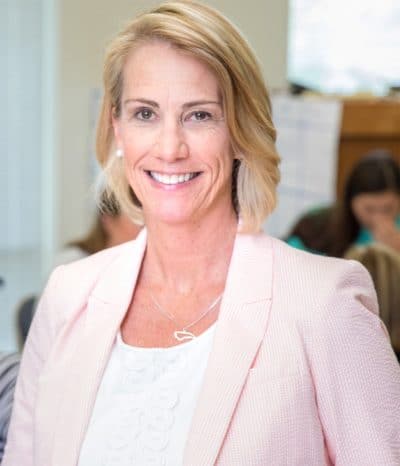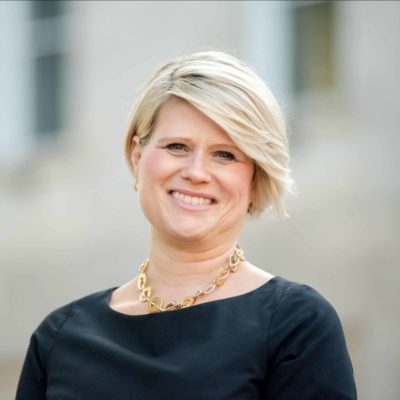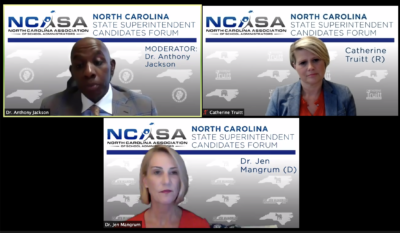
The two candidates running for North Carolina state superintendent of public instruction, Dr. Jen Mangrum and Catherine Truitt, answered questions Tuesday afternoon in a virtual conversation hosted by the Public School Forum of NC for alumni of the North Carolina Education Policy Fellowship Program (EPFP). The event was sponsored by LearnPlatform.
Truitt, the Republican candidate, who is a former education advisor for Gov. Pat McCrory and who currently serves as chancellor of the online Western Governors University North Carolina, says she’s hoping to lead the Department of Public Instruction in part because there are three areas of public education that are broken and that she would like to fix and modernize: the funding system, the human resources system, and the school accountability model.
“In North Carolina over last 30 or 40 years … what we have seen is that no matter which political party has been in charge — and no matter how much money we’ve appropriated or not appropriated — our outcomes look largely the same, and we haven’t figured out how to move the needle on student achievement, in particular for our most vulnerable students,” said Truitt.
Looking ahead, Truitt pointed to a funding recommendation contained in a report authored by WestEd, an independent nonpartisan consultant that has contributed research to the long-running school funding case known as Leandro, as one path forward.
“Right now, because of the way the funding system works at the state level, we are funding our low-income, our English language learners, and our students with disabilities at a rate that is about 33 percent higher than students who aren’t in those categories,” said Truitt. “The WestEd report is recommending 40%. So as we continue to meet the requirements of Leandro and the recommendations in the WestEd [report], I think we need to have serious conversations about what should those inputs look like … we can’t just throw more money at this problem and hope things change.”
Leandro is a 25+ year old school funding court case that is ongoing in North Carolina. The rulings that have come during this case have repeatedly found that the state is failing to meet its constitutional obligation to ensure every child has access to a sound basic education. For more background, click here.
Mangrum, the Democratic candidate and a former school teacher who in 2016 ran against Senate Majority Leader Phil Berger for the NC General Assembly, said Leandro is the top issue for her right now — along with equity among schools — as she vies for State Superintendent.
“It’s not about funding, it’s about investing,” said Mangrum, who is an associate professor of education at UNC Greensboro. “I don’t want to be sound and basic — I want us to be a world-class education system and known around the country. And that takes investment.”
Mangrum, who holds a Ph.D. in curriculum, has a master’s degree in early childhood education, and intends to work toward providing universal pre-K in the next five years, says she’ll work with the NC General Assembly to bring funding levels up to and exceeding the targets that have been set forth in the Leandro case. She also promised to resolve what she sees as the most pressing issue for the Department of Public Instruction today: a lack of leadership.
“I put out a plan back in June with the help of educators and parents about how we could reopen schools in ways that are safe,” Mangrum said, detailing which agencies were responsible for different areas of planning and execution. “We should have lots of communication and it should be transparent. Wouldn’t it be lovely if we had heard from our superintendent [Mark Johnson] frequently about what’s going on?”


School choice
Truitt emphasized the public nature of charter schools and that the state provides considerable oversight over them, determining whether a charter school can open or close based on performance concerns. Truitt also said that charter schools operate with only 75% of the per-student allotment that traditional public schools receive for each child.
“Charter schools are a viable option for school choice,” said Truitt, noting that charter schools must offer children transportation, such that no child would be denied access to that school if they did not have transportation. The same holds true, she said, for school lunch. “There’s a lot of misinformation floating around about charter schools,” Truitt said.
Charter schools are not required to offer a school lunch program or transportation to all students — traditional public schools are required to offer those things — but if a student is able to make the case that without them, he or she can’t attend that school, then a charter school must make a plan to accommodate that student.
“Choice is only meaningful if you have two high-quality choices,” said Mangrum. Charter school expansion, she said, only serves as a distraction from the goal of ensuring every child has access to an excellent school.
“We cannot expand the charter school sector until we can promise every child has access to a sound basic education,” said Mangrum.
Unlike many of her Republican colleagues, however, Truitt said she wasn’t in favor of expanding school vouchers, pointing out that they comprise just 0.8% of the state budget. The school voucher program is a controversial choice program enacted by the General Assembly in 2013 that sends public dollars to private schools without meaningful oversight or accountability.
Supporting teachers
Mangrum said professionalizing education is a key issue for her campaign. One out of three teachers are thinking about leaving the teaching profession, said Mangrum, thanks to the pandemic — and teachers are generally feeling devalued and disrespected thanks to losing many benefits and enduring poor wages over the years.
“Let’s get teacher salaries to the national average,” said Mangrum, adding that we need a NC General Assembly that won’t punish teachers by eliminating master’s degree pay, longevity, retiree health benefits, and other efforts that seek to de-professionalize education.
Teachers also don’t have the materials they need to teach, Mangrum said, instead paying for their supplies with cereal box tops and their own money. She would advocate for better teacher working conditions.
Truitt agreed teachers need to be paid more — but detailed a plan to introduce a market pay system for teachers that would see position allotments (the current funding mechanism for paying teachers) converted to dollars and given to principals.
“A principal would say oh, I cannot find a chemistry teacher,” said Truitt. “But if I pay market rate for that chemistry teacher, then maybe I’ll find one.”
“The idea of our teacher salary system sitting in legislation, capping out at around 50,000 dollars, or maybe a bit more but not much more, is very antiquated and I’d like to see that change,” said Truitt.
The conversation concluded with candidates reflecting on their leadership styles — and both agreed that the Department of Public Instruction needs some internal healing.
“What moves people is the heart, and if you make decisions based on what’s good for children in North Carolina, then my leadership will work,” said Mangrum. “I have a desire to make DPI a nontoxic place.”
“I would want to do as much as I can to remove the politics from the equation,” said Truitt. “I would want to keep students at the center.”
“And I agree with my opponent — that DPI needs to be fixed,” said Truitt.
Recommended reading

